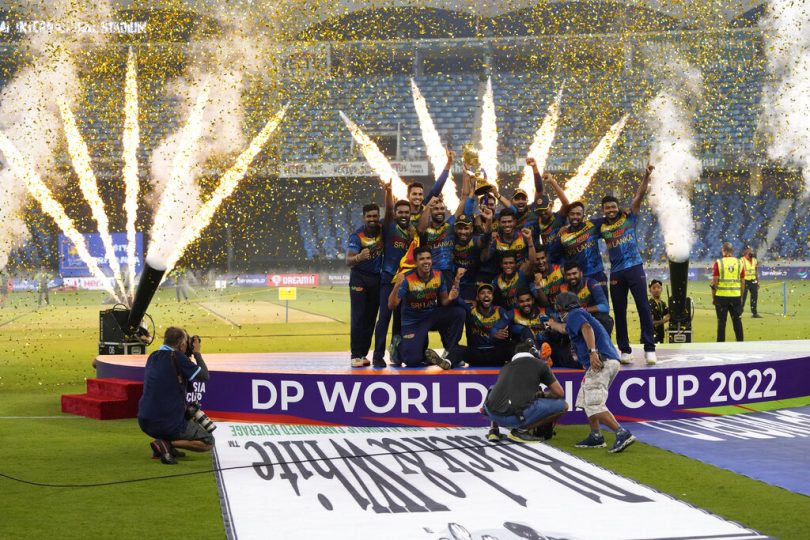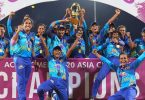The confidence of Sri Lankan cricketers has to be seen to be believed. It was this self-confidence that took them all the way to winning the Asia Cup for the sixth time.
When it comes to the Asia Cup, Sri Lanka have always done well. Besides six titles, they have finished runners-up on six other occasions in the 15-edition history (13 in 50-over format and two in T20s).
One can only feel happy for Sri Lanka winning the Asia Cup, especially after what they have been going through back home in terms of the economic crisis.
Triumphant Sri Lanka captain Dasun Shanaka dedicated the Asia Cup win to the whole nation.
“The whole nation has been waiting for this final,” he said.
His team-mate Bhanuka Rajapaksa added: “It (the final win) is a great thing, considering all the crisis happening back home. This is a tough time in Sri Lanka. We are happy we brought some smiles back on their faces.”
Sri Lanka became the second team after India to win the 20-over format of the Asia Cup. After beginning with a humiliating loss to Afghanistan, and Sri Lanka are still stunned at how they were being bowled out for a mere 105 on August 27, and after being almost eliminated by Bangladesh in their Group B match, one of their experienced players, Rajapaksa said that the Super Fours would become interesting and that he was confident of his team winning the Asia Cup.
Win the Asia Cup, Sri Lanka did in style. Not only did they beat Pakistan in the final by 23 runs but the manner in which they did it has to be appreciated. Firstly, they beat the myth (win toss, win match) in front of the 23,968 attendees at the Dubai International Stadium on Sunday that you can still win the match batting first and defending a total.
Right through the tournament, leaving aside their loss to Afghanistan, a team which did not win any of their Super Four matches, someone or the other rose to the occasion and won the matches for Sri Lanka. To win five straight matches including three of them being last-over finishes spoke of Lanka’s determination to win and bring back their T20 record on track.
Led by the batting allrounder Dasun Shanaka, who has lifted his status as a world-class finisher in this tournament, Sri Lanka made it look so easy in the end, winning two back-to-back matches against Pakistan handsomely. While the last Super Four match on Friday, in which Lanka chased Pakistan’s paltry 121 to win by five wickets, was a dress rehearsal for the final, they brushed aside any talk of Pakistan bouncing back fiercely and avenging that loss in the final.
Pakistan though almost did it by having Sri Lanka struggling at 58 for five by the ninth over.
It was these first nine overs of the final that Pakistan were in the game. Enter player of the series Wanindu Hasaranga to join man of the final Rajapaksa in the middle and it was Lanka all the way for the next 31 overs of the match. Their 58-run partnership in six overs followed by another 54 in 31 balls between Rajapaksa and Chamika Karunaratne took Sri Lanka to a decent total of 170 for six.
It may not have been enough as the pitch, after early help for the Pakistan speedsters, settled down into a beautiful batting pitch. Totals more than what Lanka posted in the final have been chased successfully, some of them being last-over thrillers.
It was to Sri Lanka’s delight that Hasaranga came good with the bat and gave Rajapaksa solid support in building Lanka’s match-winning total. Considered an all-rounder, legspinner Hasaranga has not done justice to his batting. His consistency with the bat to match wicket-taking abilities with the ball can make him a lethal weapon in the Sri Lankan armoury.
Opener Kusal Mendis may not have scored a single run against Pakistan in this tournament, falling for first-ball duck in two consecutive matches, but his solidity at the top gave Lanka the momentum to chase successfully in thrilling finishes against Bangladesh, Afghanistan and India that took them to the final.
Opener Pathum Nissanka, who is regarded more as a Test opener, showed that he also belongs to the T20 format by posting back-to-back half-centuries, the most important one (52) coming against India.
While the middle-order of Danushka Gunathilaka, Charith Asalanka and Dhananjaya de Silva did not do as well as their team would have expected, the balance was provided by the lower middle-order with Shanaka leading from the front thanks to his brilliant finishing abilities.
The Sri Lankan bowling was largely dependent on the spin twins Maheesh Theekshana, the off-spinner who impressed in the Power Play, often sharing the new ball, and leg-spinner Hasaranga, who came after the fielding restrictions were removed. Hasaranga finished as the second highest wicket-taker with nine scalps at an average of 18.88 and an economy rate of 7.39 while Theekshana took six wickets and went at 6.75 an over.
The emergence of left-arm medium-pacer Dilshan Madushanka and right-armer Pramod Madushan, both of whom made their T20I debuts in this Asia Cup, augurs well for Sri Lanka. Madushanka, who began disastrously in the final, sending down one no ball and followed it with four wide balls at which stage Pakistan were already 10 runs when the first legal delivery was completed, came back strongly and has already won laurels from opposition captains including India’s Rohit Sharma.
It may seem strange to a layman to see the Asia Cup champions going through the World Cup qualifiers to seek a place in the main tournament in Australia which starts in about six weeks’ time. Such has been their T20 form in the last couple of years that they finished outside the ICC rankings that would’ve given them a direct entry. Even in last year’s T20 World Cup, they had to go through the qualifiers.
Sri Lanka looked at it in a positive manner. Captain Shanaka said: “We played the qualifiers last year as well. So, with the team that we have, it is a set up that came through from three-four years ago. The momentum is there. Winning the Asia Cup will really help going to the World Cup. The qualifiers will help us as we will be playing in those conditions before the main tournament.”
In the World Cup, the eighth-ranked Sri Lanka are grouped with the Netherlands, Namibia and UAE. Should they top this group, they will be placed with Australia, New Zealand, England and Afghanistan in the World Cup. A runners-up finish would pit them with the teams that they beat in the Asia Cup including India, Pakistan and Bangladesh besides South Africa.
But the World Cup is for later. Now is the time to rejoice for Sri Lanka. Shanaka said that the loss to Afghanistan in the first game made them play with even more determination. The 31-year-old Shanaka said: “After the first loss, we had a serious discussion. We knew we had the talent and it was about applying in the match scenarios. The players stood up. Each and every one contributed. It is the environment that we have created as a team.”
While nobody gave Sri Lanka any chance in the Asia Cup, considering their form coming into the tournament, Shanaka and Co. quietly came, saw and conquered.







